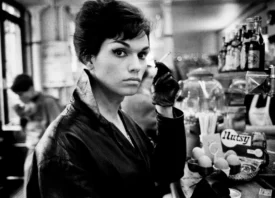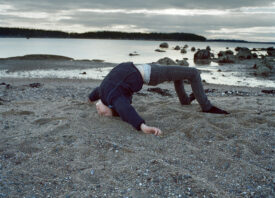Search this site
A Photographer Finds Strength and Resilience in Transgender Youth


Nearly three years ago, the London-based photographer Reme Campos met Elio, a young man with a passion for art, poetry, and social justice. She photographed him and his partner Luci on a quiet, gray February day in Queen’s Park, and although she had initially reached out to them as part of another project, she found she didn’t want to say goodbye.
Elio was the first transgender person Campos interviewed as part of her ongoing series Trans(ition), and she’s photographed him multiple times throughout the last year. Over time, she’s met a small community of young trans and non-binary people, sharing their stories through hushed, understated portraits, audio recordings, and poetry. “This is the first work where I’ve asked my sitters to write or record something about their lives, experiences, and feelings, but I think it is a way for them to express themselves a bit more,” she tells us.
Trust came with time and experience. “They are part of a community that has to be careful of who they let into their lives, so they often rely on word of mouth and anecdotes from others,” she says. “I think the more I photographed people like them, the more they understood that I was an ally and someone that could be trusted.”
For Campos, portraiture has always been about vulnerability and empathy, but what struck her again and again about these kids was their strength and resilience. She didn’t dictate what they wrote; some choose poetry and others prose. She also refrained from directing or telling people how to pose. “There is always an emotional exchange while I take a portrait,” she explains. “Sometimes I forget I have a camera and it is like I am just seeing the person with my naked eye.”
Campos prefers to stay quiet and let her images do the talking. Earlier this year, during an exhibition in Bologna, she heard a visitor say that the work needed no explanation; just through looking, she understood more than could be expressed in words alone. As the photographer reminds us, transitioning means something different to everyone; it’s a complex and individual process.
Throughout lockdown, Campos continued to work on the series, creating portraits through Zoom. She interviewed and photographed Elio via webcam in May. He told her, “After an adolescence of living as someone that felt alien to me, I’m finally taking my first steps in the world as Elio.”
That image of Elio and Luci, captured all those months ago in the park, was recently shortlisted for the Taylor Wessing Portrait Prize and was named winner of the Portrait of Britain 2019. Still, the most rewarding part of the project has been getting to know her sitters–and representing them truthfully and authentically. She plans to stay in touch with Elio. “He is not sure about his future dreams yet, but he knows that he would like to make an impact on this world and make it better,” the artist tells us. “We will have to wait and see!”
You can follow Reme Campos on Instagram at @remecampos; she regularly shares new portraits from the series, accompanied by words from her sitters.


“But I am not a woman. I never was and I never will be. My gender is present to my core. How I decide to show myself to the world is a statement of what a man can look like. I am most comfortable when I am not confined by a set of expectations.”

This isn’t a new age
This isn’t another “phase”
I’m sure of myself and can say it
For the first time in my life
I’m not bothered about what society thinks is right
But it’s hard to have faith in a human race that doubts my very existence
Dismisses my identity
Leaves my hope empty
I took time to say it confidently
Talk about my masculinity
That trans masculine is me
And of course you may not know what that means
Cause we live in a binary society
Where gender is an two word topic
I want to scream where is the logic
Because I am living proof that there’s learning to do
People need to know it’s okay to be like me and you
I must warn you
This is going to hurt
The curt words and the waiting
For medical help that takes years in the making for a first appointment
In what kind of system does treatment seem forbidden
It what kind of a world are true identities forced to hidden
This world
This system
Friend please listen
To what I have to say
This problem is not going to go away
Because simply it is a human right
Right?
If I have the right to privacy
But not to my own body
Surely that’s not fair
Surely you would care
That your body isn’t yours
That your identity isn’t on the menu
When society sets it before you
And says you must choose “






